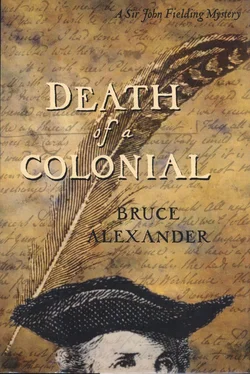Bruce Alexander - Death of a Colonial
Здесь есть возможность читать онлайн «Bruce Alexander - Death of a Colonial» весь текст электронной книги совершенно бесплатно (целиком полную версию без сокращений). В некоторых случаях можно слушать аудио, скачать через торрент в формате fb2 и присутствует краткое содержание. Год выпуска: 1999, ISBN: 1999, Издательство: Putnam Adult, Жанр: Исторический детектив, на английском языке. Описание произведения, (предисловие) а так же отзывы посетителей доступны на портале библиотеки ЛибКат.
- Название:Death of a Colonial
- Автор:
- Издательство:Putnam Adult
- Жанр:
- Год:1999
- ISBN:9780425177020
- Рейтинг книги:3 / 5. Голосов: 1
-
Избранное:Добавить в избранное
- Отзывы:
-
Ваша оценка:
- 60
- 1
- 2
- 3
- 4
- 5
Death of a Colonial: краткое содержание, описание и аннотация
Предлагаем к чтению аннотацию, описание, краткое содержание или предисловие (зависит от того, что написал сам автор книги «Death of a Colonial»). Если вы не нашли необходимую информацию о книге — напишите в комментариях, мы постараемся отыскать её.
Death of a Colonial — читать онлайн бесплатно полную книгу (весь текст) целиком
Ниже представлен текст книги, разбитый по страницам. Система сохранения места последней прочитанной страницы, позволяет с удобством читать онлайн бесплатно книгу «Death of a Colonial», без необходимости каждый раз заново искать на чём Вы остановились. Поставьте закладку, и сможете в любой момент перейти на страницу, на которой закончили чтение.
Интервал:
Закладка:
In any case, in the manner that I have described, Sir John and Richard Inskip had prepared themselves well for the interrogation of the claimant by the time we arrived at the residence of the Lord Chief Justice. And in so doing, they had become as familiar as old friends.
As I remained behind to pay the coachman his fare and collect Mr. Inskip’s portmanteau, the two gentlemen went directly to the door, Sir John, feeling about for the hand-shaped knocker, grasped it firmly when it was found and loudly made his presence known. Then, just as I arrived at the door, it came open, and there, of course, stood my old antagonist, the butler. Entering last, I took pleasure in presenting him with the portmanteau I had brought thus far. He took it with the ill grace I expected (and perhaps even hoped) he might show.
Perhaps we had arrived a bit tardy. I could in no wise be certain of that, for I had no pocket watch, yet all who were expected were already present — even one, I shall say, who was unexpected was present. The arrangement of the chairs was such that the claimant was placed in the center of the room, with the members of the commission ranged round him in a half-circle. Behind the rest and off to one side sat Sir Patrick Spenser, the Solicitor-General, who had been the moving force in the creation of the commission. My eyes went directly to him; why that was I could not say, though I then told myself it was only because I had been surprised to see him there. My gaze then shifted to the claimant, who sat at ease in the chair that had been provided him. He looked the very picture of self-assurance, as confident as any other in the room. In response to my stare, he gave me no response, not even the vaguest look of recognition.
A chair was found for Mr. Inskip; he was settled in it quickly. And I was assigned a place to the rear of Sir Johns, quite apart from the secretaire, where I had sat in the past, taking notes of the previous meetings. I thought this odd, and leaned forward to inform Sir John of this circumstance. He in turn put the question to the Lord Chief Justice, who explained that the claimant wished no written record to be kept. At that, both men chuckled, as if a joke had been told. “I daresay,” commented Sir John dryly, and the Lord Chief Justice left him to stand before the assembled group.
“This gentleman, whom you have never met, is known to you all. He has offered to answer our questions regarding his claim upon the Laningham title and holdings, Sir John Fielding and another gentleman, who shall for the moment remain nameless, will do most of the interrogating. It might be best if you held back your own questions until after they have done with him.”
Then did he turn to the claimant. “Have you anything you wish to say before we begin?’’
“Only that with my answers I hope to persuade all present of the justness of my claim.’’ The voice was quiet but confident.
The Lord Chief Justice returned then to his place and seated himself, Sir John, altogether less formal, remained seated — in fact, arranged himself a bit more comfortably upon his chair before he began.
“What is your name, sir?’’ he asked.
“Why, Lawrence Paltrow, naturally,” said he.
“But of course you would say that, would you not? Let me put the question to you differently: What is your full name?”
“Lawrence Mudge Paltrow.”
“Whence came your middle name?”
“It was my mother’s family name. She was especially proud of it in that hers were landed people in Oxfordshire, well known there when the Paltrows were still struggling to build a house with a proper roof on it — or so my mother used to say.”
“Hmmm, interesting,” said Sir John.
But was it, truly? I wondered how this discussion of his maternal forebears pertained to the matter at hand.
“You mention your mother,” said Sir John. “I had occasion to meet her shortly before her death — uh, very shortly. I happen to know that there were a number of questions which troubled her with regard to your disappearance.”
“My disappearance?” the claimant echoed. “I did not disappear.”
“Well, then, your absence.”
He hesitated briefly. “That is another matter,” said he. “Yes, I was absent from England from the fall of 1763 until earlier this year.”
“Could you account for your absence?”
“In what way?”
“Simply put, what did you do all that time? Where were you?”
“I was in the American colonies.”
“Which of them?”
“A good many of them. As to what I did, I wandered a bit from one place to another, working at various enterprises and in the employ of others.”
“Could you be more specific? What enterprises? What others did employ you?”
The claimant let loose a considerable sigh; it seemed to say that it was somewhat painful for him to look back upon that unsettled period in his life. Then he began his recitation:
“I worked for a time — over a year, perhaps not quite two, for a Mr. Custis in Virginia as secretary. It was not work for which I was particularly well suited. I worked in a number of colonies for a number of employers as a surveyor, as some of the great royal land grants were parceled into smaller farms and plantations. I invested in a coach line in Pennsylvania and helped in its operation until it failed. And then, having thus lost a good deal of money, I went back to surveying. In sum, sir, I did what I could do to earn my way. There is work aplenty in the colonies if a man be willing to dirty his hands, but if he be determined to live as a gentleman, he may quickly starve.”
“Did one of those with whom you joined in enterprise go by the name of Eli Bolt?” asked Sir John.
“Yes, but that was very early in my stay in the colonies — my first employment in the colony of Virginia.”
“You were employed and not a partner in the enterprise?”
“We were all, in some sense, employees of the colony.”
“Oh? And how was that?”
“We were employed to explore what lay beyond the Cumberland River — that is, the western limit of the colony.”
“You mean that no one had gone so far before?”
“Nothing of the kind,” said the claimant. “Why, Mr. Bolt himself had been through that country many times. He knew it well. He led the expedition. Yet it had not been properly mapped and surveyed. This was why I had come along — to map and survey.”
“And once this was finished, you were never again in contact with Eli Bolt?”
“Oh, I may have met him by chance once or twice. I recall one occasion five years past, when I was secretary to Mr. Custis. We drank whiskey together and talked of old times — the expedition and the like.”
“What of Elijah Bolton?” Sir John pronounced the name with especial clarity, as if particularly desirous that he not be misunderstood.
“What of him?”
“Let me put it to you direct: Are not Eli Bolt and Elijah Bolton one and the same?”
With that, the claimant laughed in a most convincing manner; he seemed genuinely amused at Sir Johns suggestion. “By no means,” said he. “There is a certain similarity of the names, I grant, but they are two quite separate and different people.”
“How, then, did you meet Elijah Bolton? “
“On shipboard. He was returning to England but had no employment awaiting him. He agreed to help me in my quest.”
“Your quest?”
“For statements, affidavits, et cetera.”
“Ah, yes, your proofs of identity. Why did you deem it necessary to collect them?”
“I was advised to assemble them by the family solicitor in Laningham.”
“Why did he think it necessary, or even advisable?”
“Perhaps he would be the best one to answer that, but my understanding of it was that there were two reasons principally. First of all, my appearance had altered somewhat during my years in the North American colonies. I have become much stouter and stronger and even grown two inches since last I was in England. Such a phenomenon is unusual, I know, but I was, after all, barely twenty years of age when I sailed for North America. I can only suppose that the rigorous life that I led there played some part in this.”
Читать дальшеИнтервал:
Закладка:
Похожие книги на «Death of a Colonial»
Представляем Вашему вниманию похожие книги на «Death of a Colonial» списком для выбора. Мы отобрали схожую по названию и смыслу литературу в надежде предоставить читателям больше вариантов отыскать новые, интересные, ещё непрочитанные произведения.
Обсуждение, отзывы о книге «Death of a Colonial» и просто собственные мнения читателей. Оставьте ваши комментарии, напишите, что Вы думаете о произведении, его смысле или главных героях. Укажите что конкретно понравилось, а что нет, и почему Вы так считаете.












